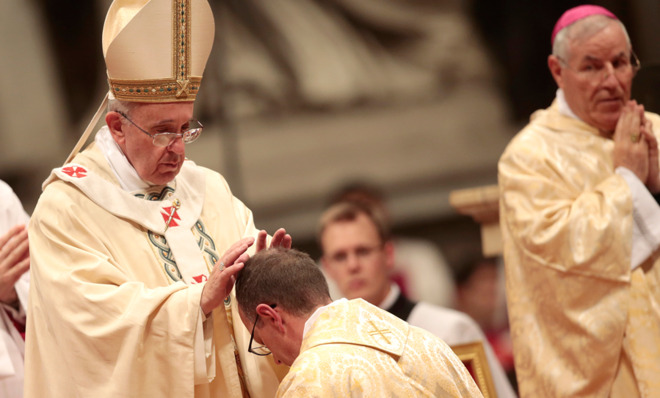Why Pope Francis won't cause a schism in the U.S. religious right
Some conservative Protestants are protesting the new tone out of Rome, but a pope only has so much power


A free daily email with the biggest news stories of the day – and the best features from TheWeek.com
You are now subscribed
Your newsletter sign-up was successful
Protestants and Catholics used to eye each other with mistrust, even deep theological enmity. But somewhere in the midst of shouting matches over the relative merits of grace versus good works, idolatry versus sainthood, and fealty to Rome, an alliance of sorts formed between conservative Catholics and evangelical Protestants in America. Opposition to abortion, gay rights, and creeping secularism got both sides singing from the same hymnal. The Religious Right was born.
That alliance has lasted through at least five presidents and two relatively doctrinaire popes. But the anti-culture-war tone from the new supreme pontiff, Pope Francis, has "driven a wedge into the powerful political alliance between conservative Catholics and evangelical Christians that's been instrumental in electing hundreds of Republicans over the past four decades," say McKay Coppins and Hunter Schwarz at BuzzFeed.
Many Protestant culture warriors agree with Bryan Fischer at the American Family Association that the new pope's pronouncements have been disappointing and alarming.
The Week
Escape your echo chamber. Get the facts behind the news, plus analysis from multiple perspectives.

Sign up for The Week's Free Newsletters
From our morning news briefing to a weekly Good News Newsletter, get the best of The Week delivered directly to your inbox.
From our morning news briefing to a weekly Good News Newsletter, get the best of The Week delivered directly to your inbox.
"It raises questions in our mind because the Catholic Church has always been a faithful shoulder-to-shoulder ally to social conservatives in the fight to protect unborn human life" and heterosexual-only marriage, Fischer tells BuzzFeed. "We simply have questions of whether we'll be able to count on the Catholic Church to be comrades-in-arms to continue to fight these battles."
Coppins and Schwarz even get this amazing quote about Pope Francis from Tracy Pyland, a Maryland born-again Christian: "That man needs to read his Bible."
The Dish's Andrew Sullivan is jubilant that, as he sees it, Francis is breaking up the Catholic-evangelical party:
The Catholic hierarchy has been knocked sideways by the emergence of Pope Francis and his eschewal of their fixation on homosexuality, contraception, and abortion. That fixation — essentially a Christianist and de facto Republican alliance among Protestants and Catholic leaders — has now been rendered a far lower priority than, say, preaching the Gospel or serving the poor and the sick. Francis has also endorsed secularism as the proper modern context for religious faith. [The Dish]
Conservative Catholics argue that the media is blowing the new pope's liberal-ish statements out of proportion, but they don't fully disagree with Sullivan, either. "The pope's most controversial statements seem to arise from a single motive: He doesn't like 'right-wing' Catholics, and wants to make it clear to all the world that he's not one of them," says John Zmirak at The American Conservative. (Zmirak doesn't mean that as a compliment.)
A free daily email with the biggest news stories of the day – and the best features from TheWeek.com
And it's true that, as Sullivan says, some of what the pope has to say "could almost be designed to infuriate Protestant Christianists," not to mention conservative Catholics. Here, Pope Francis calls "Christian ideology" a "serious illness" that drives a wedge between people and between the church and the people:

But it won't drive a serious wedge between conservative Catholics and evangelical Protestants.
The long papacy of happy culture warrior John Paul II didn't turn Ted Kennedy or John Kerry or Joe Biden or Nancy Pelosi — Catholics all — into anti-abortion activists. And Pope Francis' shift away from cultural politics won't convert John Boehner or make any of the conservative Catholics on the Supreme Court — Antonin Scalia, John Roberts, Samuel Alito, and Clarence Thomas — less eager to overturn Roe v. Wade (or strike down the death penalty, for that matter).
The pope in many ways sets the tone for the Catholic Church, but it's the local bishops and archbishops who guide the flock, along with the thousands of parish priests. To change the church a pope can tinker with the foundational texts and catechism to some extent, issue encyclicals, and remake the church hierarchy. That last part takes time: Every sitting cardinal and almost every bishop was named by Popes John Paul and Benedict XVI. Frances, at age 76, probably won't remake the episcopate in his image.
For "wayward Catholics," Pope Francis' words "may be an invitation back to a church slowly becoming once again recognizable," says Caitlin Bancroft at PolicyMic. But "his fresh perspective may become nothing more than a brief moment in the religion's long, static history."
Peter has worked as a news and culture writer and editor at The Week since the site's launch in 2008. He covers politics, world affairs, religion and cultural currents. His journalism career began as a copy editor at a financial newswire and has included editorial positions at The New York Times Magazine, Facts on File, and Oregon State University.
-
 The Olympic timekeepers keeping the Games on track
The Olympic timekeepers keeping the Games on trackUnder the Radar Swiss watchmaking giant Omega has been at the finish line of every Olympic Games for nearly 100 years
-
 Will increasing tensions with Iran boil over into war?
Will increasing tensions with Iran boil over into war?Today’s Big Question President Donald Trump has recently been threatening the country
-
 Corruption: The spy sheikh and the president
Corruption: The spy sheikh and the presidentFeature Trump is at the center of another scandal
